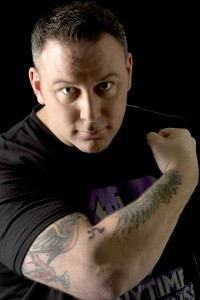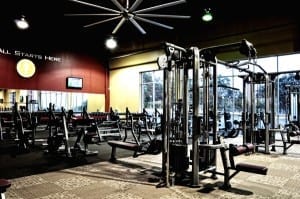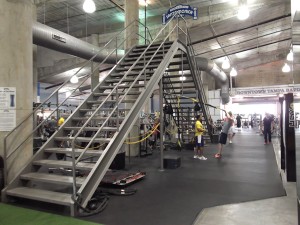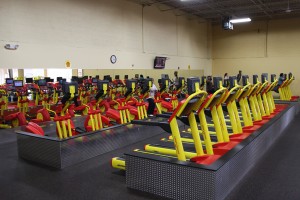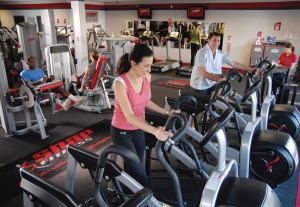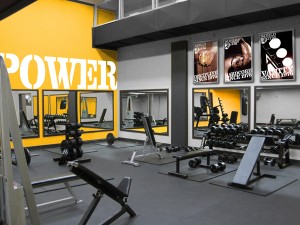Becoming a franchisee means becoming an integral part of the machine that is the multi-million dollar franchising industry. By signing a franchising agreement, franchisees receive instant access to other club operators, tools and a network of support from people who all want the same outcome — to be successful.
Many of the franchisees we’ve interviewed already had profitable businesses or careers before signing on to own a franchise — what exactly made them decide to take the plunge into franchising? For many, it was the aforementioned plethora of knowledge that was awarded from becoming a franchisee.
Anytime Fitness
Anytime Fitness employees live by the slogan, “Bleed Purple” — and many of them do — the “Running Man” logo has been inked onto the bodies of thousands of Anytime Fitness members, owners and employees.
Founded by Chuck Runyon and Dave Mortensen, the first Anytime Fitness club opened on May 30, 2002 in Cambridge, Minn. Since then, around 2,000 Anytime Fitness clubs span across 49 states and multiple countries around the world, serving almost 1.5 million members worldwide. IHRSA recently labeled Anytime Fitness “The World’s Fastest-Growing Fitness Club,” and its franchisees are an integral part of that growth.
So, how does it feel to be a franchisee of a company that inspires its employees and members to permanently mark themselves with the Anytime Fitness brand?
For Alex LaVallee, being an Anytime Fitness franchisee feels like being part of a family. LaVallee joined the Anytime Fitness team with his business partner in 2008. Previously, he had owned his own mortgage company, but wanted to diversify his interests. Since opening his first club, he now owns an additional eight clubs in Massachusetts, Connecticut and Rhode Island, and another three are in the pipeline. “The people I’ve met through Anytime Fitness are my close, close friends,” said LaVallee.
According to LaVallee, Anytime Fitness is characterized by support. “I had so much support just from the start,” he said. “We’ve had hundreds of conversations and not once have I ever felt like a burden. The people at corporate connect with you so that you want to be a better franchisee.”
That support has led LaVallee to believe that his growth opportunities with Anytime Fitness are limitless. “Owning 30-50 clubs is the dream,” said LaVallee, “And they would allow for me to grow more.”
A year ago, LaVallee joined the “inked” club and got an Anytime Fitness tattoo of his own — the Running Man logo now graces his arm. His decision to ink the logo onto his body stemmed from the impact becoming an Anytime Fitness franchisee has made on his life. “It’s emotional,” said LaVallee. “My life is 100 percent better than it was three and a half years ago.”
Gold’s Gym
Joe Gold knew how to create an iconic brand, and Gold’s Gym was where it all started. Gold opened the first Gold’s Gym near the beach in Venice, Calif. in 1965. There are now 670 Gold’s Gyms opened worldwide, run by 602 franchisees, and it has become one of the most recognizable names in the health and fitness industry.
Sam Adams, a former defensive tackle for the Seattle Seahawks, Baltimore Ravens, Oakland Raiders, Buffalo Bills, Cincinnati Bengals and Denver Broncos, knows the importance of branding. He recognized the weight the Gold’s iconic name could carry, and knew right away that becoming a Gold’s Gym franchisee would be a perfect fit. “The NFL is branded for the NFL — when you step on the field, and when you walk off it, it’s NFL everything,” said Adams. “That’s why it was easy for me to pick the Gold’s Gym brand. For me it was a no brainer. It put me in my comfort zone.”
Adams joined the Gold’s Gym brand three months ago, when he converted his existing full-service gym to Gold’s. He now has two Gold’s Gyms, and will have a total of four at the end of 2012. “My experience has been awesome,” said Adams.
Gold’s Gym helps new franchisees such as Adams with everything from marketing to sales. However, according to Tim Hicks, the senior vice president of franchising and licensing for Gold’s Gym, the biggest asset to new franchisees are five franchise business consultants located in various territories across the country. These franchise business consultants help new franchisees get their gym up and running, and provide seasoned franchisees with support. “The franchise business consultants are a major asset,” said Hicks.
Another perk to being a Gold’s Gym franchisee, one of which Adams recognized, was the over 45 years of experience Gold’s Gym has in the fitness industry — experience that franchisees, once they sign the franchising agreement, gain access to. “We have 98 percent brand awareness,” said Hicks. “In the fitness world, if you were to ask people in the industry if they’d heard of Gold’s Gym — 98 percent would say yes.”
To Hicks, this speaks to customers, and benefits Gold’s Gym’s franchisees. “Any time you can plant a seed in a consumer’s mind with brand awareness, it helps the franchisees,” he said.
So far, Adams is confident he made the right choice in becoming a Gold’s Gym owner. “I would say, if you have a shared passion for the health and fitness industry, Gold’s Gym is a place for you to be,” he said.
Powerhouse Gym
The Santa Monica stairs in Los Angeles, Calif. are a popular workout destination for L.A.’s most dedicated fitness enthusiasts. Comprised of about 180 steps, throughout the day you can find people tackling the stairs, which have become an alluring attraction for those looking for a good, challenging workout.
On the other side of the country, in Tampa Bay, Fla. a club owner created his own set of Santa Monica stairs. Matt Midyett, the owner of the Powerhouse Gym in Downtown Tampa Bay, replicated the stairs to provide his members with the famous fitness challenge.
A native of California, Midyett opened his Downtown Tampa location three years ago with his brother Eddy Midyett and brother-in-law John Sanginetti. “Tampa was really hurting for an old-school gym,” said Midyett.
Powerhouse Gym appealed to Midyett, due to the licensing agreement it gives owners, versus a traditional franchising agreement. This gave Midyett the ability to install signature items exclusive to his club, such as the replicated Santa Monica stairs. “The thing I like is that we can put our own signature on our club,” said Midyett. “It’s not a cookie-cutter club.”
Other amenities exclusive to Midyett’s Powerhouse Gym include jump ropes, a 12-station multi jungle, a rock wall, sand pit and beer kegs for functional training. “We found as we were building the club, that functional training was what people were really interested in,” explained Midyett.
Brothers William and Norman Dabish founded and opened the first Powerhouse Gym in Highland Park, a suburb of Detroit, Mich. in 1974. The Highland Park location is still standing, and since its opening has been joined by an additional 280 clubs nationwide. “It is a family business,” said William Dabish. “We’ve built it our whole life.”
William Dabish and his son, Henry Dabish, the CEO of Powerhouse Gym, extend their knowledge of the business to licensees — treating them as part of the Powerhouse Gym family. Midyett was impressed with the fact that after applying to be a licensee, he was able to speak with one of the founders directly. “They’re there with support and experience and even mentor us,” said Midyett. “One of the things about Powerhouse Gym is, the brand they’ve built is very well respected. It has really evolved as the name has evolved, and we’re really excited about the future.”
Retro Fitness
Megan Sweitzer, the co-owner of the Retro Fitness in East Norriton, Penn., recently ran in the 5K hosted by her club. As she ran, she was amazed to hear the different stories of how her club, through fitness, had impacted the lives of its members.
One woman, Tracie Beagler, entered Retro Fitness walking with a cane. After working with one of Sweitzer’s personal trainers, she’s now able to walk aid-free and finished Retro Fitness’ recent 5K. Another member, Kay Hart, lost 60 pounds and 7 percent of her body fat while her husband was away in Afghanistan.
“The 5K was amazing,” said Megan. “I listened to some of the members who were running, and was amazed at how many of their lives had been changed. I truly love the gym for that reason.”
According to Megan, none of this would have been possible if she and her husband, Jeff, hadn’t become Retro Fitness franchisees. “We couldn’t just have gone out, opened a gym, and been successful,” she said. “Franchising gives you a proven model to follow to be successful.”
Megan and Jeff opened their first Retro Fitness location in 2011, the same year Entrepreneur.com named Retro Fitness the “Fastest Growing Franchise.” Since Retro Fitness’ founding by Eric Casaburi in 2002, the franchise has opened 86 clubs and has approximately 60 franchisees.
Because Megan and Jeff had never owned a gym before, they worked hard to be successful club owners. “We’re in there every day,” explained Megan. “I’m committed to learning everything my staff does so that I can be a better owner. We’re going to do everything we can to keep our members happy.”
To facilitate their hard work, the couple look for support from Retro Fitness’ corporate office whenever needed. “Corporate really held my hand through opening the gym, and I still talk to them often,” said Megan.
In the end, becoming a Retro Fitness franchise was a way to fulfill a dream previously thought unreachable. “I’ve always had a passion for fitness,” said Megan. “We work really hard to be successful.”
Snap Fitness
The first Snap Fitness opened in April 2004 in River Falls, Wis. Characterized by its small-box, compact facilities, although its clubs may be small, Snap Fitness’ reach is wide — 1,301 locations serve approximately 900,000 members worldwide, in countries such as the U.S., Canada, India and Australia.
After retiring from the Air Force in 2006, Jeff Spencer became intrigued by the possibility of owning his own business — but at first, he was skeptical at the idea of franchising. “Quite frankly, I was expecting to take a job in the Seattle area with a major defense contractor,” said Spencer. “But something in me was intrigued about running my own business and being my own boss. I liked the idea of being able to see the result of my hard work,” he said.
That was six years ago. Now, Spencer is the owner of six Snap Fitness locations in the Spokane, Wash. area, and was Snap Fitness’ 2011 “Franchisee of the Year.”
Snap Fitness’ “hands on” approach with its franchisees is what appealed to Spencer. The fitness chain helps its franchisees with everything from in-house financing assistance, real estate and site selection, to club design and training support. “Snap Fitness sets us up for success,” said Spencer. “They make it very easy to follow the system and offer very solid support in becoming successful. They have thought through just about every scenario that we will encounter. And, if something new comes up, they are lean and mean enough at HQ to adjust positively to any situation.”
In addition to a hands on approach with franchisees, Snap Fitness encourages club owners to take a similar approach with members. “[Snap Fitness] encourage us to get to know our clients and treat them special,” he explained. “We are truly a neighborhood gym. We don’t just rent a treadmill. We really do want to see our clients get results.”
As for growth at Snap Fitness, Spencer wants to see the six clubs he currently owns grow in capability, membership and revenue. “I want people in Spokane, Wash. and Coeur d’ Alene, Idaho regions to say, ‘those Snap Fitness clubs do it right.’”
World Gym
When Wes Hodgson, a World Gym managing partner and franchisee in Canada, converted his already successful clubs to the World Gym brand in September 2010, he threw an elaborate party for his members. Hiring a DJ and turning the gym into a nightclub, Hodgson threw the party to celebrate his partnership with an iconic brand made famous by founder Joe Gold, who garnered a following of muscled celebrities such as Arnold Schwarzenegger and Lou Ferrigno. “We threw a Hollywood-muscle-themed party to show our members what World Gym is all about,” said Hodgson.
Hodgson made the decision to convert his existing clubs to World Gym after searching for opportunities to grow. “We looked into some other franchises, and when we came across World Gym, we saw that what we wanted to create, they had already accomplished,” said Hodgson. “The biggest thing is that the name has tremendous value. It’s such a unique brand. Why would you want to do it by yourself? Especially in today’s marketplace.”
World Gym’s conversion plan may appeal to many existing club owners for exactly that reason. According to Keith R. Albright, a franchise development consultant representing World Gym, World Gym’s conversion plan is a highlight and a key strategy for 2012. “Converting is good for clubs doing well on their own because they can gain further benefit from being a part of the World Gym family,” explained Albright.
World Gym will work with club owners who wish to convert to its brand by covering half of the re-branding costs and reducing the initial franchising and royalty fees. World Gym will also give owners access to its Preferred Vendor Program, and special terms of pricing. “That’s a deliberate strategy to make it easier for owners to say ‘yes’ to conversion,” explained Albright. “We believe in the partnership model of franchising.”
World Gym has partnered with 140 franchisees and serves approximately 750,000 members across 200 clubs in 15 countries. Hodgson loves the access to World Gym’s many owners that being a franchisee gives him. “Being able to share information with other franchisees is invaluable,” said Hodgson. “And being a franchisee allows the owner the ability to focus on their business without having to build a brand. We get to focus on running the gym, and that’s what we’re best at.”
By Rachel Zabonick



